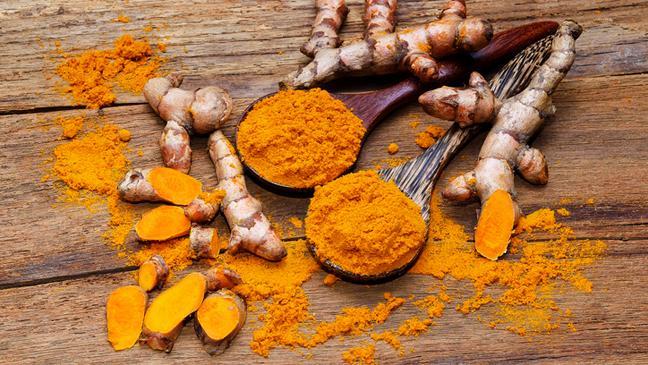
Image credit: http://bit.ly/2e3i09a
Turmeric is the spice that gives curry its yellow color. It has been used in India for thousands of years as a spice and medicinal herb. Recently, science has started to back up what the Indians have known for a long time. It really does contain compounds with medicinal properties . These compounds are called curcuminoids, the most important of which is curcumin.
1. Turmeric Contains Bioactive Compounds With Powerful Medicinal Properties – Curcumin is the main active ingredient in turmeric. It has powerful anti-inflammatory effects and is a very strong antioxidant.
2. Curcumin is a Natural Anti-Inflammatory Compound – Curcumin is a strong anti-inflammatory component ( it is so powerful that it matches the effectiveness of some anti-inflammatory drugs1)
– Curcumin actually targets multiple steps in the inflammatory pathway, at the molecular level. – In several studies, its potency has compared favorably to anti-inflammatory pharmaceutical drug, except without the side effects2
3. Turmeric Dramatically Increases The Antioxidant Capacity of The Body – Curcumin has powerful antioxidant effects (It neutralizes free radicals on its own, then stimulates the body’s own antioxidant enzymes) Oxidative damage is believed to be one of the mechanisms behind aging and many diseases. It involves free radicals, highly reactive molecules with unpaired electrons. Free radicals tend to react with important organic substances, such as fatty acids, proteins or DNA. The main reason antioxidants are so beneficial, is that they protect our bodies from free radicals. (Curcumin happens to be a potent antioxidant that can neutralize free radicals due to its chemical structure3. But curcumin also boosts the activity of the body’s own antioxidant enzymes4)
4. Curcumin Boosts Brain-Derived Neurotrophic Factor, Linked to Improved Brain Function and a Lower Risk of Brain Diseases – Curcumin boosts levels of the brain hormone BDNF (which increases the growth of new neurons and fights various degenerative processes in the brain) (One of the main drivers of this process is Brain-Derived Neurotrophic Factor (BDNF), which is a type of growth hormone that functions in the brain5. Many common brain disorders have been linked to decreased levels of this hormone. This includes depression and Alzheimer’s disease. – Curcumin may be effective at delaying or even reversing many brain diseases and age-related decreases in brain function
5. Curcumin Leads to Various Improvements That Should Lower Your Risk of Heart Disease – Improving the function of the endothelium (lining of the blood vessels, thus lowers risk of heart disease)
(Several studies suggest that curcumin leads to improvements in endothelial function. One study shows that is as effective as exercise, another shows that it works as well as the drug Atorvastatin6 – Curcumin reduces inflammation and oxidation, which are also important in heart disease.
6. Turmeric Can Help Prevent (And Perhaps Even Treat) Cancer – Tumeric can reduce angiogenesis (growth of new blood vessels in tumors), metastasis (spread of cancer), as well as contributing to the death of cancerous cells7
7. Curcumin May be Useful in Preventing and Treating Alzheimer’s Disease Alzheimer’s disease is the most common neurodegenerative disease in the world and a leading cause of dementia. – curcumin can help clear these plaques which causes Alzheimer’s disease8 ( key feature of Alzheimer’s disease is a buildup of protein tangles called Amyloid plaques)
8. Arthritis Patients Respond Very Well to Curcumin Supplementation Arthritis is a common problem in Western countries, and most involve some sort of inflammation in the joints. – Curcumin was even more effective than an anti-inflammatory drug for patients with rheumatoid arthritis9 – Studies have noted improvements at the effects of curcumin on arthritis symptoms10
9. Studies Show That Curcumin Has Incredible Benefits Against Depression Curcumin has shown some promise in treating depression. – Curcumin boosts BNDF levels, potentially treating depression11
– Evidence that curcumin can boost the brain neurotransmitters serotonin and dopamine12 (which in turn may help with Parkinson’s disease)
10. Curcumin May Help Delay Aging and Fight Age-Related Chronic Diseases – Due to its Anti Inflammatory Properties – Due to its Antioxidant Components
To try our Rhymba Hills which contains Tumeric, Rhymba Hills AntyOxy, please click here.

References:
http://www.turmeric.co.in/turmeric_medicinal_use.htm
https://authoritynutrition.com/top-10-evidence-based-health-benefits-of-turmeric
https://www.ncbi.nlm.nih.gov/pmc/articles/PMC3633300/
https://www.ncbi.nlm.nih.gov/pubmed/19594223
https://www.ncbi.nlm.nih.gov/pubmed/10404539
https://www.ncbi.nlm.nih.gov/pubmed/15489888
https://www.ncbi.nlm.nih.gov/pubmed/17569207
http://onlinelibrary.wiley.com/doi/10.1002/jat.1517/abstract
http://www.tandfonline.com/doi/abs/10.1080/02772248.2013.829061
https://www.ncbi.nlm.nih.gov/pubmed/15650394
https://www.ncbi.nlm.nih.gov/pmc/articles/PMC2504526/
https://www.ncbi.nlm.nih.gov/pubmed/23146777
https://www.ncbi.nlm.nih.gov/pubmed/18588355
https://www.ncbi.nlm.nih.gov/pmc/articles/PMC2758121/
https://www.ncbi.nlm.nih.gov/pubmed/16988474
https://www.ncbi.nlm.nih.gov/pubmed/22407780
https://www.ncbi.nlm.nih.gov/pubmed/20657536
https://www.ncbi.nlm.nih.gov/pubmed/7390600
https://www.hindawi.com/journals/tswj/2009/624894/abs/
http://link.springer.com/article/10.1007/s00213-008-1300-y
http://www.sciencedirect.com/science/article/pii/S0014299905006230
